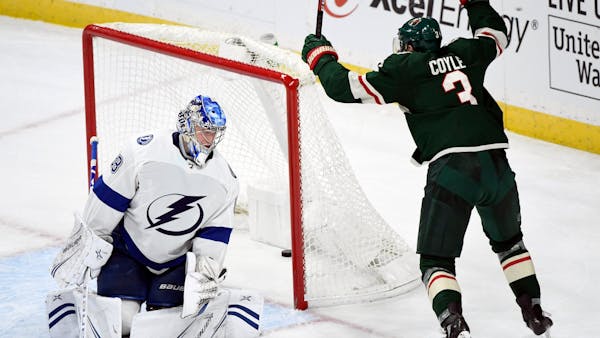The result has been the same for three straight games, and so have the factors behind each win for the Wild.
Its goaltending has been impactful, whether it be the franchise-record 24 saves Devan Dubnyk made against the Stars in the second period Friday, or the assist Alex Stalock had on the game-winning goal in overtime Saturday against the Lightning.
Offense has been ignited by the defense, with the blue line having a hand in all but three of the team's 10 goals. And the Wild's top-six forwards have also been headliners. At least one scored in all three games, and two — winger Mikael Granlund and center Eric Staal — were responsible for the production in the 2-1 win over the Coyotes.
Perhaps the most obvious catalyst, though, has been the team's proficiency in the third period, since it has overcome deficits or broken a tie in the final frame at each stop on this win streak — an early-season trend that has the Wild (4-2-2) encouraged as it pauses for a four-day break in the schedule.
"I'd much prefer to start out 2-0 and then increase it, but it's also a really good thing when a team starts to believe it can come back," coach Bruce Boudreau said. "I've been fortunate enough to be with some teams that in the third period when they were down they said, 'OK, we know we can score goals,' and they do.
"It's not what you want to have to rely on all the time, but it's nice to know that you never give up and you never think you're out of it."
After two more third-period goals in that 5-4 overtime victory over the Lightning on Saturday at Xcel Energy Center, the Wild boasted 10 on the season — tied for the third-best in the NHL.
Conversely, its five first-period tallies sat tied for the third-worst total, and only two teams surrendered more goals in the first than the nine the Wild has given up. Those struggles could help explain why the team is finding itself in rally mode at the end of the game.
"I think we're saving it in the first as of right now," winger Jason Zucker said. "We need to try and fix that."
That a veteran team isn't ready at the start but has enough energy to amplify the pressure in the third when fatigue should be an issue can seem baffling, but maybe this paradox highlights the power of experience.
And the Wild has plenty of that.
"We're showing ourselves, and we know what we have," center Charlie Coyle said. "We keep proving it to ourselves and doing that early on in the year, that's a sign of things to come and better things to come, too. We don't want to always wait for the third, but we know the resiliency of this team and that's a good thing to have going forward."
How the Wild has gone about flexing this advantage is clear.
In each of its three wins last week, the team played a much more disciplined style in the defensive zone in the third. It cut back on shots-against and penalties, with the Lightning and Stars registering only four shots apiece and the Coyotes managing eight. Overall, the Wild committed just one third-period penalty in those games after getting whistled 12 combined times in the first two periods.
At the other end, the Wild was aggressive — taking more chances to score and racking up 36 shots in those third periods. The team had just 25 in the firstperiods during the win streak.
"We really simplify the game," Boudreau said.
Stretch out this approach for an entire 60 minutes of play, and the Wild might not need to be clawing back in the third. Instead, it could be cruising to victory.
But urgency is a unique motivator, and being able to elevate its play when it matters is a trait that can come in handy.
"We have gotten points out of games where we've dug ourselves holes and maybe we didn't deserve them from where we put ourselves," Stalock said. "It's amazing the points we've picked up. It's a credit to the guys in here."
